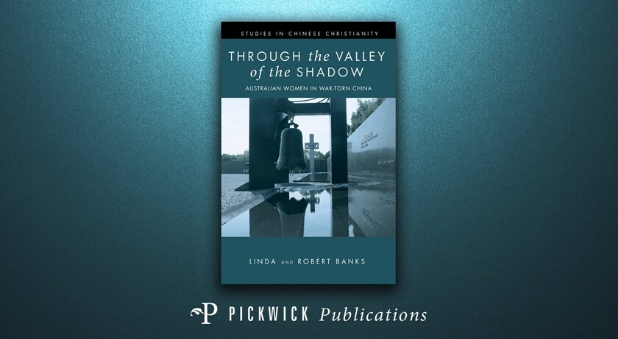I’ve been brainwashed. I find it almost impossible in this era of instant everything to want to read anything that doesn’t declare “three-minute read” at the top of the page. Thanks, internet.
Have I become sensitised to holding a book in my hand and having the patience to find the treasures in the text? And in the case of this book, not a lot of text – only 118 pages.
I’ve just finished reading Through the Valley of the Shadow: Australian Women in War-Torn China by Linda and Robert Banks. A compelling title. As we delve into the year, so soon after the excesses of Christmas and the holiday period, we need a book like this one. To remember that today is not the only day that matters, nor the ones to come, but that the people of yesterday must still teach and influence us and – more than that – stretch us into a more godly and missional tomorrow. We don’t stand alone. We are, in fact, on their shoulders.
This book tells us the stories of five young, single Australian women who went with the Church Missionary Society to China during times of war and unrest around the turn of the 20th century. And stayed a long time.
The reader is the beneficiary of a great deal of research that utilises personal diaries, newspaper articles, letters and books. The writers have gathered decades of information and put them into captivating chapters for us.
My reading locations could not have provided a clearer perspective. I read at the hairdresser, latte in hand. I read at a beachside café, watching hundreds of attractive, wealthy people strolling past. A particularly poignant moment was when I read about the women in this book: “their hearts ached when they saw worshippers prostrating themselves before statues of idols”.
What is wrong with my heart that it no longer aches? I see idolatrous people from my café seat and feel little towards them. Will my coffin, much like the one of the women in the book, declare “Jesus only”? How could I agree, like those in the book, that a massacre is a “significant stimulus” to missionary endeavour, rather than a whopping setback? You must read this book to find out.
"Will my coffin declare "Jesus only"?
These women had a well-developed strategy for reaching women, and then their families; for reaching students and staff. These women knew how to pray and to trust, they experienced tremendous fear and surprising joy, and they could say in the midst of a devastating crisis, “Sisters… we’re all going Home together” and take courage!
I loved these women by book’s end, and I can’t help but keenly want to be like them. Looking around me I see very few live examples of such extraordinary living.
Imagine deriving genuine solace equal to genuine fears: “after the screams and sounds of shooting it was a comfort to have such a great promise as ‘Fear not, for I am with thee (Isaiah 41:10 KJV)’”.
There are women who also lived through Japanese occupation of China, despite fears of germ warfare (the plague literally being dropped from planes), murder, rape, looting and witnessing constant injustice. As a fellow camp internee said of Martha and Eliza Clark in the mid 1940s in Shanghai, “Their faith was indeed sufficient for them in all things”.
Books like this one provide a vital reality check for a modern life which derides wisdom and experience from history, and which discourages reading for more than three minutes. Pick up this little book and be amazed at the size of its challenge, and perhaps win a new ache in your heart.






















